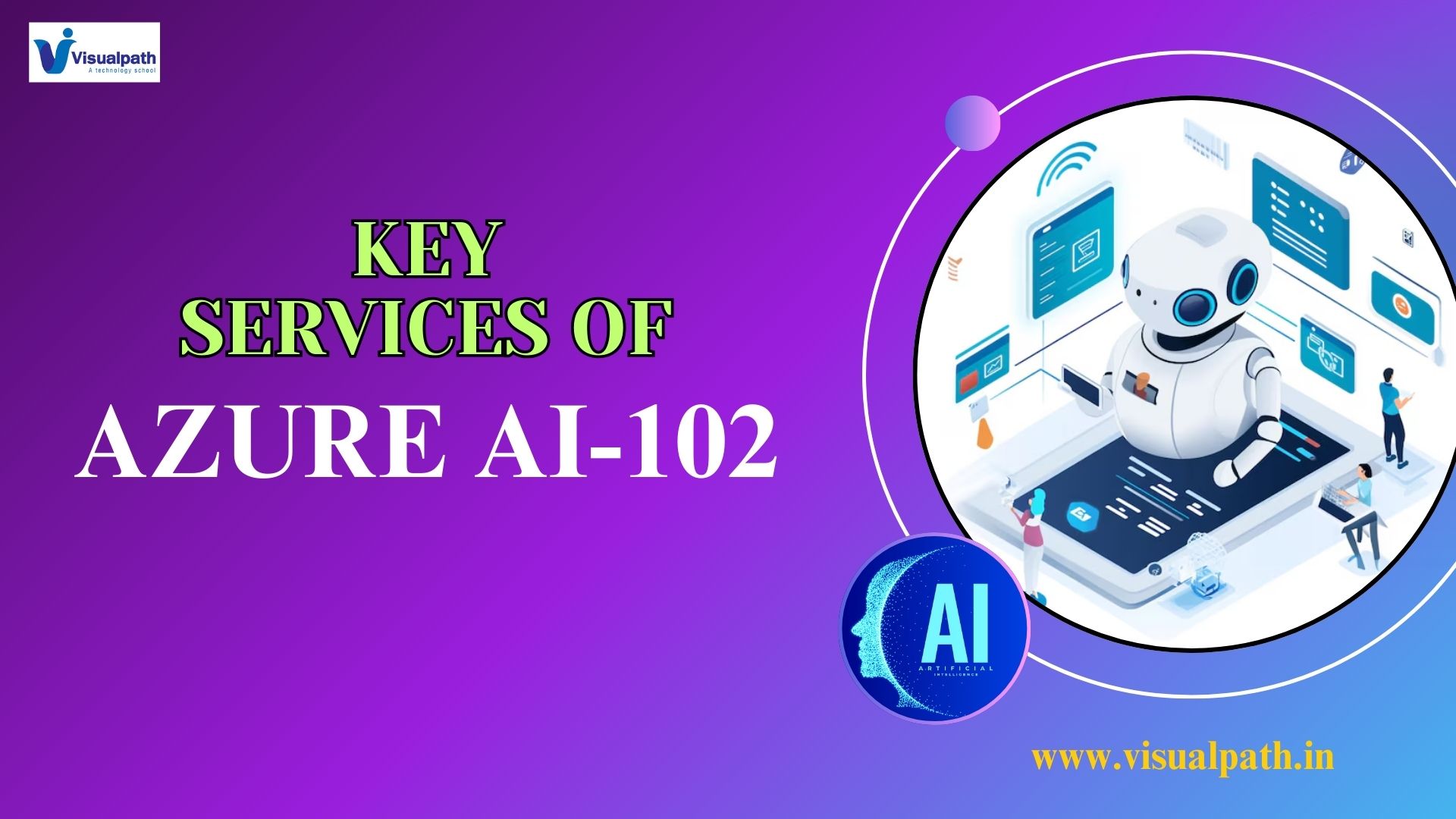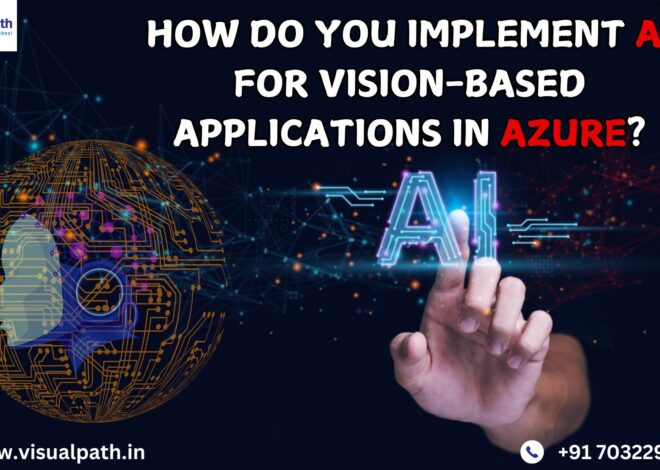Introduction:
Azure AI is Microsoft’s suite of artificial intelligence (AI) services designed to enable developers and organizations to build smart applications without needing in-depth knowledge of AI. By leveraging pre-built models, machine learning tools, and cognitive services, Azure AI empowers businesses to implement AI solutions quickly and efficiently. Whether you are developing applications for computer vision, language understanding, speech recognition, or decision-making, Azure AI offers a wide array of services that can be seamlessly integrated into applications without requiring advanced coding skills. AI-102 Certification Training
Key Services Provided by Azure AI
Azure AI services are structured into several key categories, each catering to specific AI capabilities: Cognitive Services, Azure Machine Learning, and Azure Bot Services. These services provide pre-built APIs and no-code or low-code tools, making AI accessible even to non-programmers.
1. Azure Cognitive Services
Azure Cognitive Services are pre-built AI models that allow developers to integrate powerful AI capabilities into their applications. These services can be accessed via simple APIs, requiring minimal to no coding experience, and they enable applications to see, hear, speak, and understand. The key components of Cognitive Services include:
a) Vision
Azure’s Vision services allow you to build applications that can analyse and interpret visual content. Key offerings include:
- Computer Vision: Extract information from images or videos, recognize objects, and detect faces. For example, Computer Vision can automatically tag images with descriptions, analyse video streams in real-time, or even categorize objects.
- Custom Vision: Customize image classification and object detection models for your specific needs using a no-code platform. Upload images, tag them, and train models without writing a single line of code.
- Face API: Detect and recognize faces in images, including emotions, age, and facial attributes. AI-102 Microsoft Azure AI Training
- Form Recognizer: Extract text, key-value pairs, and tables from documents such as invoices or receipts. This is perfect for automating data entry tasks.
b) Language
Azure offers various language-related services that help with natural language processing (NLP):
- Text Analytics: Analyze text for insights such as sentiment analysis, key phrase extraction, language detection, and entity recognition. This is ideal for gauging customer feedback or performing market research.
- Translator: Provides real-time, multi-language translation services to integrate into apps or websites.
- Language Understanding (LUIS): Build custom models that understand and process user input, perfect for chat bots or virtual assistants.
- QnA Maker: Turn documents, FAQs, and manuals into an interactive Q&A experience with no coding. This is commonly used in customer service to build knowledge bases.
c) Speech
Azure’s Speech services provide AI-driven capabilities for speech-to-text, text-to-speech, and speech translation.
- Speech-to-Text: Converts spoken words into text in real-time, helping with transcriptions, closed captioning, or voice-controlled apps.
- Text-to-Speech: Converts text into natural-sounding speech. This can be customized using neural voices, giving applications a more human-like interaction.
- Speech Translation: Translates spoken words from one language to another in real-time, great for multi-lingual environments. Azure AI-102 Online Training
d) Decision
Azure’s decision-making services help automate complex decision-making processes:
- Personalizer: Provides personalized recommendations for individual users based on their preferences and behavior.
- Anomaly Detector: Identifies unusual patterns in time-series data, useful in areas like fraud detection or equipment failure prediction.
2. Azure Machine Learning (AML)
Azure Machine Learning is a comprehensive suite designed to help build, train, and deploy machine learning models at scale. It caters to both data scientists with advanced machine learning knowledge and beginners through no-code or low-code tools.
a) Automated Machine Learning (Auto ML)
Auto ML allows users to create machine learning models automatically without writing code. You can select a dataset, specify the prediction goal, and Auto ML will handle model selection, feature engineering, and hyper parameter tuning. This is perfect for those without extensive machine learning experience but who need to build predictive models.
b) Azure Machine Learning Designer
Azure ML Designer is a drag-and-drop interface where users can build, test, and deploy machine learning models without coding. The visual interface includes built-in algorithms and modules, such as data transformation, model training, and evaluation. The Designer is an excellent tool for quickly experimenting with machine learning models in a visual, intuitive environment. Azure AI Engineer Training
c) Data Labeling
Azure ML also offers data labelling services, where users can upload data and label it for training machine learning models. This is particularly useful for building custom models for specific use cases such as image recognition or text classification.
d) Model Deployment
Once models are trained, Azure ML simplifies the deployment process. Models can be deployed as APIs to serve real-time predictions, allowing businesses to integrate machine learning insights into their operations quickly.
3. Azure Bot Services
Azure Bot Services provides tools and frameworks to create, test, and deploy intelligent chat bots across various platforms such as websites, messaging apps, and customer service systems. These bots can handle customer inquiries, guide users through services, or provide automated support. Azure AI Engineer Online Training
a) Bot Framework Composer
For non-programmers, the Bot Framework Composer offers a no-code interface to design and create bots. It allows users to define conversation flows, integrate with other Azure AI services (like LUIS and QnA Maker), and deploy bots across channels like Teams, Slack, or Facebook Messenger.
b) Integration with Cognitive Services
By integrating LUIS (Language Understanding Intelligent Service) and QnA Maker into bots, users can build intelligent, conversational bots that understand natural language and respond effectively to customer inquiries. Microsoft Azure AI Engineer Training
Conclusion
Azure AI provides a powerful suite of tools that make AI accessible to all, regardless of technical expertise. From Cognitive Services for pre-built AI functionalities to Azure Machine Learning for creating custom models without coding, and Azure Bot Services for building intelligent chat bots, Microsoft Azure AI makes it possible for businesses to embed AI into their operations seamlessly. By using these services, businesses can quickly develop AI solutions that improve customer experiences, streamline operations, and gain insights from data—all without needing to write complex code. Azure AI’s no-code/low-code approach empowers both technical and non-technical users to harness the power of AI.
Visualpath is the Best Software Online Training Institute in Hyderabad. Avail complete Azure AI Engineer Associate (AI-102) worldwide. You will get the best course at an affordable cost.
Attend Free Demo
Call on – +91-9989971070
WhatsApp: https://www.whatsapp.com/catalog/917032290546/
Visit: https://visualpath.in/microsoft-azure-ai-102-online-training.html




